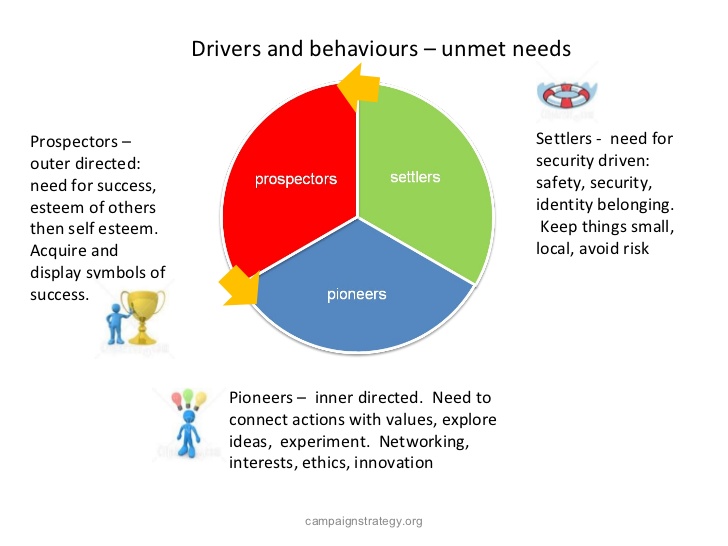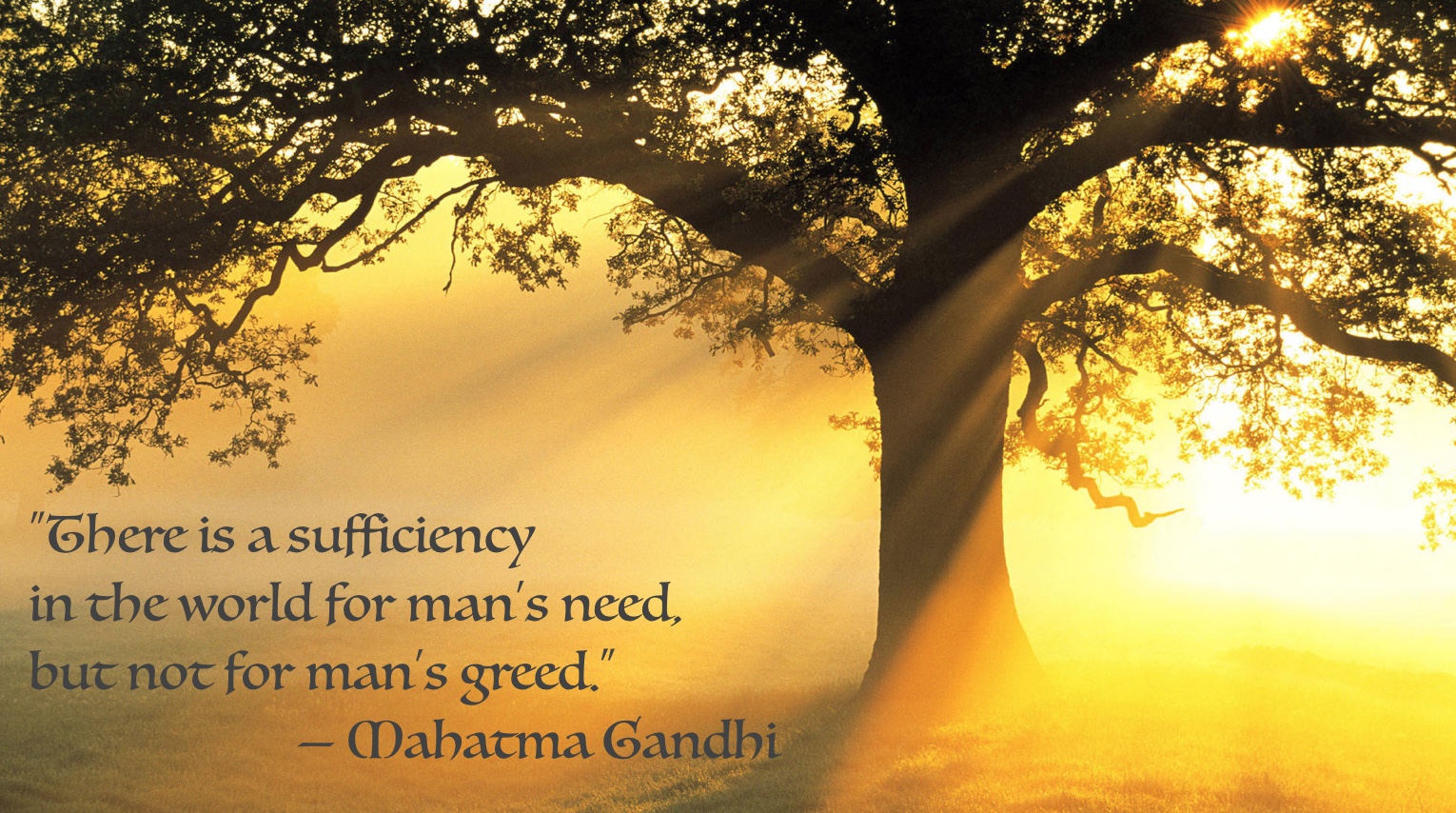“There is only one force bigger than Mother Nature, and that is Father Greed.”

So writes the Pulitzer Prize winning journalist, Thomas Friedman. He’s concerned, rightly, at our lack of progress on the United Nation’s 2030 Global Goals, so is suggesting in this interview with The Sustainian that politicians can spark massive investment in sustainability by leveraging corporate greed.
“The next great global industry has to be clean energy, clean water and energy efficiency, otherwise, we are going to be a bad biological experiment.”
I’d love to know how that idea is landing with you right now. Does it seem like a sensible, pragmatic plan to incentivise change? Does it fill you with revulsion? Or somewhere in between?
Myself, I’m somewhere in between, but leaning somewhat towards the revulsion end of the spectrum.
As I wrote from the World Ocean Summit earlier this year, I’m with Einstein on the dictum that “No problem can be solved from the same level of consciousness that created it”. There again, the shift in consciousness is proving to be a perilously long time in coming.
I’m reminded of a workshop I attended five or six years ago (which obviously had a big impact on me, because my memory isn’t usually this good). It was about values and frames, and was run by Common Cause. As we arrived in the morning, we were asked what we thought were the biggest challenges facing the world. Our answers were compiled on a flipchart. Once we were all seated, we were asked to look at a chart of 57 values, and put marks next to the ones that we thought would be most useful, and the least useful, in addressing those challenges. (More information about Shalom Schwartz’s basic human values research here.)
 Our consensus, which is borne out by the research, was that the most constructive values were intrinsic values, broadly classed as benevolence and universalism. The least useful values were extrinsic values such as hedonism, achievement, and power.
Our consensus, which is borne out by the research, was that the most constructive values were intrinsic values, broadly classed as benevolence and universalism. The least useful values were extrinsic values such as hedonism, achievement, and power.
Further, we were warned about appealing to extrinsic values in order to trigger “good” behaviours. Rewards, incentives, and bribes were considered to be at best successful in the short term only (as parents of small children may attest), and at worst to condition people to expect rewards for actions that should be internally motivated.
This ties in with research by Barry Schwartz (no relation of Shalom, as far as I’m aware) on Why We Work, which is summarised by the wonderful Maria Popova in her Brainpickings article, which I highly recommend:
“When we lose confidence that people have the will to do the right thing, and we turn to incentives, we find that we get what we pay for… There is really no substitute for the integrity that inspires people to do good work because they want to do good work. And the more we rely on incentives as substitutes for integrity, the more we will need to rely on them as substitutes for integrity. We may tell ourselves that all we’re doing with our incentives is taking advantage of what we know about human nature… But in fact, what we’re doing is changing human nature. And we’re not merely changing it; we’re impoverishing it.”
What Schwartz suggests is that the best motivation is based not on reward and punishment but on what Adam Smith called the “impartial spectator” — an imaginary figure who evaluates the morality of our actions objectively and to whom we hold ourselves accountable, our own internal Jiminy Cricket.
So at this point it looks as if we are straying into dangerous territory if we try to get people to do the right things for the wrong reasons.
But are we assuming that all people are the same? Could it be that a more nuanced approach is possible?

In How to Win Campaigns (a refreshingly self-explanatory title), Chris Rose tells us that there are three kinds of people in the world (or at least in the UK):
Settlers (31%): motivated by resources and by fear of perceived threats. They tend to be older, socially conservative and security conscious. They are often pessimistic about the future, and are driven by immediate, local issues affecting them and their family (and probably voted for Brexit).
Prospectors (37%): Driven by the esteem of others. They are motivated by success, status and recognition. They are usually younger and more optimistic. They are often conscious of fashion or image, and tend to be swing voters.
Pioneers (32%): Motivated by self-realisation. Their views are governed by values of collectivism and fairness. In their personal lives they are ambitious, but seek internal fulfilment rather than the esteem of others.
(More about these Values Modes here. And for the campaigners reading this, I highly recommend Chris’s books, and there are also oodles of information on his Campaign Strategy website.)
 So we can imagine that a Pioneer would, and should, not be moved by external incentives. But a Prospector might, if it made them look good. And a Settler would be more likely to be influenced by issues affecting their family and community than by anything Thomas Friedman or the UN might have to say. So arguably there is a role for external motivations, even if they only work for slightly over a third of the population.
So we can imagine that a Pioneer would, and should, not be moved by external incentives. But a Prospector might, if it made them look good. And a Settler would be more likely to be influenced by issues affecting their family and community than by anything Thomas Friedman or the UN might have to say. So arguably there is a role for external motivations, even if they only work for slightly over a third of the population.
To return to Friedman, I wonder if he would respond by saying I’m creating a straw man argument, that he was talking about appealing to the greed of corporations, not individuals, which are not the same thing (no matter what US law may say on the matter), and that because corporations have a profit motive, they are not so much the sum of their parts, as a completely different kind of organism that is and should be motivated by greed. But then are we in danger of reversing the encouraging trend towards the idea that companies can do well by doing good?
There are implications for complementary currencies like the forthcoming app, Dashboard.earth, that “rewards” environmentally beneficial behaviour with points that can be redeemed at participating businesses. Even in the yin currency of Bali, with its element of ostracization if a family does not fulfil its pledge of time and/or money to support a community project – is this not also extrinsic motivation?
I’m going to leave the final word to Neale Donald Walsch, author of Conversations with God. Last week, in my blog post on Yin, Yang, and Jung, I shared the idea that because our financial systems have buried the Great Mother archetype representing abundance, we have ended up with its shadows, greed (see above) and scarcity.

NDW writes: “The reason that you do not behave this way on Earth is that you do not think there is enough for everyone, and so you have to make sure that you get yours. It is the idea of scarcity that stifles the idea of full and complete sharing. What your planet could benefit from right now are a few more humans willing to demonstrate and model a new form that humanity could take, based on their belief in Sufficiency and Sharing, and in this way helping to awaken the species.”
I’d love to hear your thoughts on this. Should we be taking a “whatever it takes” approach to motivating behaviour change? Or should we be holding out for a shift in consciousness? Or a blend of both?
Other Stuff:
I’m delighted to have been invited to a Global Economic Visioning summit in New Hampshire next month. It’s wonderful to know that these topics I’ve been thinking about are gaining traction and importance. I’m sure it will be a fascinating three days!


oh…so very tricky. ..here are a few rambling thoughts in no particular order!
I imagine folks will modify behaviour when then can see a good reason why and even more so if it directly impacts on them.. However , if the changes require inconvenience or increased cost it becomes difficult. The “convenience” lifestyle is one of the biggest environmental threats we are faced with and I fear that legislation and compulsion may well be the only way to remove some”pollutants” from our society (ie Bans). Maybe social media is highlighting just what we are doing to our planet and creating a certain atmosphere for small change. However, like minded folks on social media stick together so whether ideas for the need to change reach new audiences on the likes of Facebook is rather doubtful. In my case the overriding need currently is to help to promote actions that may make the world a reasonable place environmentally for my grandchildren to enjoy all that nature has to offer and for an ethos of treating the planet as something that requires looking after and is not to be abused .
Governments can play a big part via legislation , assuming they are brave enough.
The current puzzle I am juggling with is why , for example Austria , has virtually zero litter and the Uk has a hideous amount. Both nations have lots of convenience foods and packaging but Austria does not dump in the street and countryside. Clearly education plays a big part…and sadly the Uk does very little to promote children’s understanding of good citizenship and the need to comprehend how mankind can damage our planet.
In short …it is a flipping difficult conundrum!
It is indeed tricky, David, and it gets even harder in countries like the US that have a very individualistic, anti-interference stance towards government, which is why they often seem to vote against their own best interests (e.g. against healthcare). Countries like Austria, Switzerland and Singapore have a very different attitude towards government – there is more of a social contract that citizens will do what they’re told because they trust that the government will act with their best interests at heart.
I agree with your points about social media echo chambers and the convenience lifestyle. We are killing ourselves with convenience – which is really rather inconvenient!